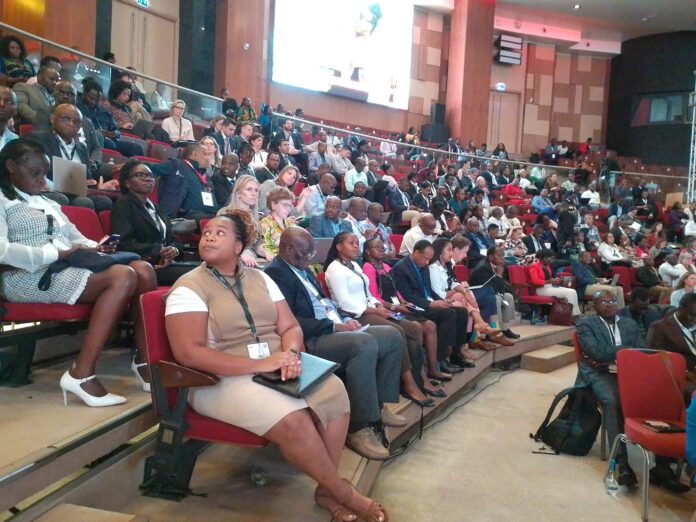By Godfrey Ombogo
Kigali, Rwanda: African governments have been urged to work together in championing one health and the fight against climate change.
Amref Health Africa Group CEO Gitahi Githinji says Africa and its people today are facing four frictions that need synergy and harmony to successfully tackle; COVID-19 and public health threats, climate change, conflicts in Africa and elsewhere, and cost of living.
“While the burden of COVID-19 has lessened, recent outbreaks of other diseases such as Ebola, Marburg, and cholera demonstrate that our health security is always at risk,” Dr. Githinji during the opening session of the Africa Health Agenda International Conference (AHAIC) 2023 on March 6 in Kigali, Rwanda.
“Climate disasters including droughts, famines, and floods are causing destruction and loss of life across the continent. And while Africa contributes the least to emissions and global warming, it is the most vulnerable to its impacts, reminding us that there is no discount to consequences of decisions made in your absence!” said Dr. Githinji.
He urged Africa to build a shared vision that reimagines its health systems to meet the needs of communities under these four threats.
Dr. Githinji said Amref is also looking forward to a common continental approach to Africa’s plan for adapting health systems to the climate crisis at the Conference of Parties (COP28) in the United Arab Emirates in November 2023.
“This is a future that no country, no organization, and no individual can achieve alone. We must all come together as ‘One Africa, One Economy for Health’ and our presence at AHAIC23 demonstrates our collective commitment to the journey ahead,” he said.
The AHAIC 2023 is being hosted by Amref Health Africa, Africa Centres for Disease Control and Prevention (Africa CDC), African Union, and Rwanda’s Ministry of Health as co-conveners working together with a host of partners.
Africa CDC Acting Director Ahmed Ouma called on African governments to invest more in health systems to make the continent more prepared for emergencies such as the COVID-19 pandemic.

“The experience we’ve had through the COVID-19 pandemic and recent outbreaks such as Mpox, Ebola, cholera, etc., is a direct consequence of an inadequate investment in public health – in the health workforce, in pandemic preparedness and response machinery, and in the actual health system itself,” said Dr. Ouma.
He called on all the 55 member states of the African Union (AU) to address the shared health threats we face in Africa and beyond more holistically.
With the emergence of zoonotic diseases becoming more frequent, it is apparent that the relationship between humans, animals, and the environment cannot be ignored anymore, hence the need for the One Health approach in managing disease prevention and control efforts.
Dr. Ouma said Africa CDC is supporting Ministries of Health and National Public Health Institutes (NPHIs) to build capacity, while simultaneously improving coordination for the prevention and control of priority zoonotic diseases across other integral parts of the health sector.
“We are also supporting our countries to establish and operationalize Public Health Emergency Operations Centres (PHEOCs), which should be the central coordinating hubs for disease surveillance and response coordination across Africa,” he said.
According to the African Institute of Development Policy (AFIDEP), Africa is experiencing phenomenal population growth, even as the effects of climate change get worse.
The continent’s population of 1.417 billion people is projected to grow to 2.478 billion by 2050, while that of sub-Saharan Africa is expected to rise from 1.168 billion to 2.112 billion during the same period.
“Currently, 44 percent of Africans live in urban areas – mostly in slum settlements where health and environmental effects of climate change are quite dire,” said AFIDEP Executive Director Eliya Zulu.
Dr. Zulu expressed concerns that climate change threats to health are only partly understood, making it difficult for governments to achieve Universal Health Coverage (UHC). This, he said, calls for a lot of capacity building on the integration of health systems and climate change issues.
For Dr. Shakira Choonara, a Technical Specialist at the World Health Organization (WHO), colonization of public health and human rights and gender bias among those designing UHC programs are the biggest problems facing African health systems.
“Stop politicizing women’s health,” said Dr. Choonara.
Dr. Ouma said the best way to end the colonization is by building local resources and a workforce. He also emphasized the need to bring together manufacturing and Africa’s health needs so that the continent can stop “exporting jobs while importing products such as masks”.
“When there is an emergency, the local resources come first before we can ask for help. These resources include private entities built and run by us here in Africa and our philanthropists,” said the Africa CDC boss.
Dr. Oyewale Tomori, a professor of virology at Redeemer’s University in Nigeria, said the best way for African governments to ensure capacity building and retention is by creating an enabling environment for medical practitioners. They should also build their resource base instead of always rushing for foreign aid.
“Aid only fuels corruption. If we manage our resources effectively, we will not need their aid,” said Prof Tomori.
Last month, a leaked memo from Kenya’s Ministry of Health showed plans to restrict unemployed medics from flying abroad for greener pastures, citing a shortage of health workers in the country.
This came days after a Sunday Nation investigative story revealed that thousands of Kenyan doctors were on the verge of giving up after failing to secure employment for as many as five years after graduating from medical school.














